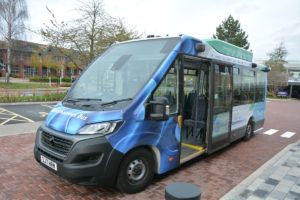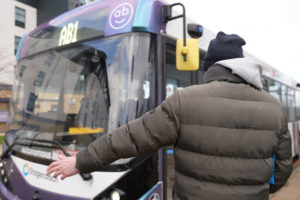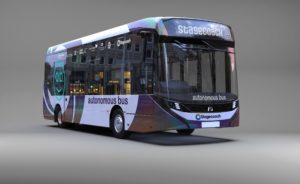
In a few years’ time, the business of self-driving vehicles could also add tens of billions of pounds to the UK economy and create tens of thousands of jobs across the country.
There are currently two major trials taking place in Oxfordshire and Scotland to demonstrate how the services could work in practice.
OXFORDSHIRE
Last month, a zero emission automated bus service, operated by First Bus, began trials on public roads in Oxfordshire.
The new the Milton Park Circular Service 1, using a fully electric Mellor Orion E bus converted to automated operation by Fusion Processing, will operate within the business, science and technology park near Didcot and Abingdon.
This is designed to improve the way people move both around the park, home to 250 companies and 9,000 employees, and the wider Didcot region.
Led by First Bus, the project is made up of a consortium comprising Fusion Processing, Oxfordshire County Council, University of the West of England (UWE Bristol), Zipabout and Milton Park.
The consortium, which has been working on the scheme for five years, hopes to launch the public service in the coming weeks once testing is concluded, subject to final regulatory processes.
Janette Bell, Managing Director at First Bus, said: “The launch of the UK’s first zero emission autonomous vehicle is a stellar example of how technology can support modal shift with wide partnership working between Central and Local Government, operators and local business.
“We’re excited to now be able to offer customers an even greener and quieter way to travel, and we cannot wait to hear some feedback on the new buses.”
The new 16-seat fully accessible single-decker bus has a safety driver on board at all times to provide a personalised service and information to passengers.
The vehicle is fitted with Fusion Processing’s sensor and control technology, CAVstar, that enables it to run on pre-selected public roads within Milton Park without the safety driver having to intervene or take control.
This automated drive system combines a range of Radar, LiDAR and optical sensors with artificial intelligence processing unit, and it can be retrofitted into any vehicle to provide SAE Level Four autonomy.
Jim Hutchinson, CEO at Fusion Processing, said bus automation gives fleet operators the opportunity to enhance safety and operational efficiency.
“Our market analysis indicates that the commercial vehicle segments are where we will see autonomous vehicle technology first used in large scale deployment”, he added.

Part of the Mi-Link green travel programme, the £4.3 million project has been part funded by a £3m grant from the UK Department for Transport’s Centre for Connected and Autonomous Vehicles (CCAV) via Innovate UK.
Mike Biddle, Innovate UK Executive Director for Net Zero, said: “This multi-connected and autonomous vehicles project, part of a wider package of government R&D funding, will deliver the research required to support the future of multi-modal passenger carrying services.”
SCOTLAND
Meanwhile, in January, bus and coach operator Stagecoach successfully transported its first group of passengers in a trial in East Scotland, as part of the CAVForth project.
A fleet of five Alexander Dennis Enviro200AV full-sized automated buses covered a 14-mile route, in mixed traffic, at up to 50mph from Fife to the outskirts of Edinburgh.
In the trial, an experienced bus driver monitors the automated system alongside a bus ‘captain’, who moves around the saloon, talking to passengers about the service and answering any questions they may have.
The aim is to demonstrate what a future service might feel like when the staff member is able to leave the cab while the automated system does the driving.
The buses are also fitted with Fusion Processing’s CAVStar technology, enabling them to run on pre-selected roads without the safety driver having to intervene or take control.
CAVForth is part-funded by the UK Government’s Centre for Connected and Autonomous Vehicles and is a partnership between Stagecoach, Fusion Processing Ltd, Alexander Dennis, Transport Scotland, Edinburgh Napier University, Bristol Robotics Lab and UWE Bristol.
This test fleet of five Enviro200AV diesel buses is capable of carrying more than 10,000 passengers a week.
Jamie Wilson, Head of Concepts & Advanced Engineering at Alexander Dennis, said: “We are delighted that the UK’s most complex autonomous bus project has now carried its first passengers in another important step for the CAVForth project.
“The feedback from the Co-Design Panel (a group of local bus user volunteers) is a great validation of the work we are doing as we continue the final stages of testing ahead of the launch of scheduled passenger services later this spring.”
The second phase of the CAVForth automated bus project in Scotland, is set to feature a longer, more challenging route.
Known as CAVForth 2, the £10.4m-expansion of the project will see the current route between Fife and Edinburgh extended an additional five miles into Dunfermline city centre.
The complex driving conditions and traffic flows found in urban areas will enable further testing and development of the buses’ Level Four automated driving capability along the 19-mile route.

Carla Stockton-Jones, UK Managing Director of Stagecoach, said: “We look forward to working with our partners across the country to roll out CAVForth and the other autonomous projects awarded funding, which will all help to ensure that the UK remains firmly on the map for its advancements in autonomous technology.”
The connected and automated mobility sector is of crucial importance to the UK, with the potential to deliver safer, cleaner and more efficient transport systems across a wider range of settings.








